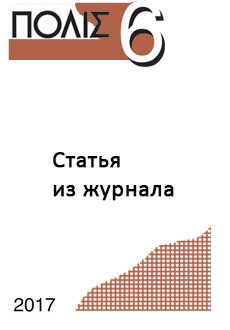Online shop of "Polis. Political Studies" Journal
We in the world, the world in us
Nikovskaya L.I., Skalaban I.A. Civic Participation: Features of Discourse and Actual Trends of Development. – Polis. Political Studies. 2017. No 6. P. 43-60
150 руб.
The article presents the conceptualization of new trends in the processes of civic participation both in Russia and abroad, which can be considered as sign of a crisis. It is shown that the processes of participation in the public sphere are characterized by a blurring of the boundaries between social, civic and political participation, the growth of the network and individualized forms of participation, primarily promotional design and type. In these conditions, relevant is the refinement of the essential characteristics of civic participation. According to the authors, it can be comprehended as the process through which citizens directly or indirectly affect the adoption of socially significant decisions affecting the public interest. On the basis of analysis of empirical studies, the authors conclude that the development of Russian civic practices lies, in general, within the international trends. These practices have their own specifics. For instance, they are characterized by a redistribution of the centre of gravity from the political to the social space, due to the decrease in the efficiency of functioning of state and municipal authorities, the persistence of a paternalistic strategies, in collaboration with civil society, as well as asymmetrical model of dialogue between the state and civil society based on the tradition of the monologue, propaganda, manipulation of public opinion that sets the civil initiatives clearly specified “track”.
 English
English Русский
Русский

Reviews
There are no reviews yet.